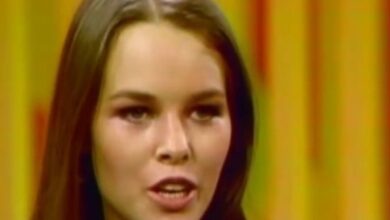Heart Moves Led Zeppelin to Tears with a Soul-Stirring “Stairway to Heaven” at the Kennedy Center Honors
When Heart stepped onto the Kennedy Center Honors stage in 2012 to salute Led Zeppelin, few could have predicted the emotional gravity that would unfold. Ann and Nancy Wilson, accompanied by a full orchestra, gospel choir, and Jason Bonham on drums, offered a rendition of “Stairway to Heaven” that managed to both honor and transform the iconic track. Their performance felt less like a cover and more like a deeply personal interpretation of a sacred rock hymn.
The room was heavy with anticipation. Not just dignitaries like President Barack Obama and First Lady Michelle Obama filled the seats, but also a cross-section of legends from the world of music, film, and politics. As Ann began to sing the opening verse, the room fell still. Her voice, clear and soaring, created a silence that was more reverent than passive—a quiet brimming with collective awe.
In a backstage interview later, Nancy Wilson shared how they centered themselves before walking out. She described visualizing a bowl of water balanced in her hands—an image that symbolized grace under pressure. That sense of fragile control translated onstage into a performance filled with authenticity and quiet determination, culminating in Ann’s first vocal line, which seemed to release the breath of the entire audience at once.
Jason Bonham brought more than technical skill to the drums; he brought legacy. As the son of the late John Bonham, Led Zeppelin’s original drummer, his playing carried emotional weight. Every cymbal crash and kick felt infused with remembrance. His restraint and precision weren’t attempts to imitate his father but to honor him through presence and intention. The performance was about more than timing—it was about feeling.
At a pivotal moment midway through the piece, a gospel choir entered wearing bowler hats—a nod to John Bonham’s trademark look. Their layered voices took the song to a spiritual high point. What began as a rock ballad evolved into a full-blown anthem of transcendence. The choir didn’t just back the Wilson sisters; they elevated the performance into something celestial, an outpouring of reverence that left the room visibly moved.
Among those most touched was Robert Plant. Known for his reluctance to embrace covers of Led Zeppelin’s work, Plant was visibly overcome. Cameras captured him mouthing “Wow,” and wiping away tears. Later, he would admit that hearing “Stairway to Heaven” played poorly over the years had distanced him from it emotionally—but this version brought it back to life for him. Jimmy Page and John Paul Jones, seated beside him, were equally stunned.
What resonated most with Plant wasn’t flawless technique but pure, unfiltered passion. Watching two women reimagine the song with such honesty, backed by musicians who understood its soul, allowed him to reconnect with its original spirit. It was no longer a song trapped in nostalgia; it was suddenly alive again, relevant and moving, even to those who had played it thousands of times before.
Nancy Wilson later lightheartedly remarked, “Try playing ‘Stairway’ with freezing hands in front of Jimmy Page.” The pressure was immense, but they faced it head-on. Heart’s guitarist that night, Shane Fontayne, had perhaps the most daunting role—replicating Page’s legendary solo. And he rose to the occasion with grace, crafting a note-perfect, yet emotionally original version that even Page reportedly praised with a rare and heartfelt, “You nailed it.”
The performance reached millions within hours of airing. Its emotional power resonated far beyond the concert hall, spreading like wildfire across social media. Viewers who had never seen Heart live, or even considered themselves Zeppelin fans, were drawn in by the sincerity. The video went viral not for spectacle, but because it reminded people of what music can be—intimate, healing, and profoundly human.
Ann Wilson would later describe the experience as something euphoric. She spoke of singing the song from her very core—not just performing, but becoming the emotion behind every note. Even veteran Kennedy Center staff, no strangers to iconic performances, were teary-eyed. The union of artistic reverence and raw vulnerability created a shared moment unlike anything before or since.
At the post-performance gathering, Plant reportedly approached the Wilson sisters and offered his gratitude, expressing that this was the first time he’d heard the song played in a way that truly honored its intent. Jimmy Page echoed that sentiment, adding that it was rare to see such depth and heart preserved in a reinterpretation of Zeppelin’s legacy. The approval wasn’t just polite—it was profound.
This rendition by Heart did more than honor a legendary band—it reframed one of rock’s most sacred songs as a living piece of art. It introduced a new generation to the song’s power and reminded older listeners why they fell in love with it in the first place. It transcended time, gender, genre, and even the expectations that typically come with tribute performances.
More than ten years on, the performance continues to be regarded as the gold standard for musical tributes. It wasn’t simply a faithful reproduction—it was a bold reimagining steeped in respect and devotion. That night at the Kennedy Center, Heart reminded the world that great music isn’t meant to be preserved in glass. It’s meant to be felt, reinterpreted, and kept alive through fearless, loving expression.





